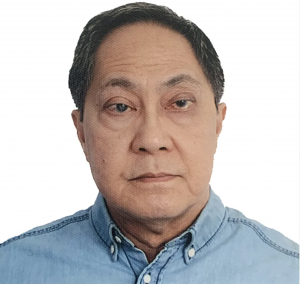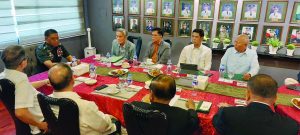Enact anti-dynasty law now, ex-AFP, PNP chiefs urge
Enact anti-dynasty law now, ex-AFP, PNP chiefs urge

By Jarius Bondoc
GOTCHA
March 1, 2024
Lawmakers blame poverty on the Constitution’s economic restrictions. But a select group of retired generals and colonels think otherwise. It’s politicos who are to blame for dynastic reigns that impoverish Filipinos.

ANI members in meeting with AFP Chief Gen. Romeo Brawner (File photo)
Congress must thus enact an anti-dynasty law once and for all, former Armed Forces and National Police chiefs and fellows urge. More so since the Constitution requires such legislation.
Fifty percent of Filipinos rate themselves poor and another 30 percent near poor, Social Weather Stations surveys show. Studies pinpoint the most penurious to be where dynasts rule. In 2021 the Philippines was ASEAN’s third worst, with 18.1-percent poverty level against less than ten percent in seven better neighbors.
Seventeen have so far signed an “Appeal to Congress to Enact a Law Prohibiting Political Dynasty”. All are founding members of Advocates for National Interest (ANI), uniformed retirees who also served in civilian agencies and private firms.
Among them are former AFP chiefs Gen. Renato S. De Villa, Victor S. Ibrado, and Alexander B. Yano. Plus former PNP Dir. Gen. Recaredo A. Sarmiento II, Philippine Military Academy superintendents LTGen. Edilberto P. Adan and Maj. Gen. Melchor P. Rosales, and Association of Generals and Flag Officers chairman Vice Adm. Emilio Marayag.
De Villa was executive secretary to President Gloria Macapagal-Arroyo, and before that defense secretary to Presidents Cory Aquino and Fidel Ramos. Yano served as ambassador to Brunei. Adan headed the Presidential Commission on the Visiting Forces Agreement; Rosales, interior undersecretary. Marayag led the retirement and separation benefits system.
ANI has denounced several times China’s aggression in the West Philippine Sea. “But our call for Congress to pass a law against dynasties jibes with our concern for external and internal security,” ex-Col. Mariano Santiago told Sapol-DWIZ Saturday.
“Senators and congressmen are bickering over Constitutional restrictions on foreign capital. But 37 years since ratification of the Constitution, they have ignored their covenant with the people to end dynasticism,” Santiago said.
A lawyer, Santiago called “malfeasance” past and present lawmakers’ neglect of an anti-dynasty law. “They can be held criminally liable.”
The 1987 Charter states in Article II, Declaration of Principles and Policies, Section 26: “The State shall guarantee equal access to public service, and prohibit political dynasty as may be defined by law”.
Senators Miriam Defensor-Santiago (deceased), Francis Pangilinan, Panfilo Lacson, and Grace Poe separately sponsored bills against dynasties, recounted Santiago, former Land Transportation Office head. “But all were voted down.”
The 2017 Constitutional Commission, under former Senate President Aquilino Pimentel Jr. and Chief Justice Reynato Puno defined dynasties. That is, successive or simultaneous positioning of spouses, offspring, siblings, parents, grandparents, and grandchildren – or up to the second degree of consanguinity or affinity.
A hundred dynasties have been around for more than a century. They emerged during the last two decades of Spanish rule, when municipal elections were opened to rich mestizos. American and Japanese colonizers retained them and their scions in puppet governments.
Lawmakers now want to open ownership of natural resources, utilities, universities, and advertising to foreigners, beyond the 40-percent limit. But the Spaniards, Americans, and Japanese used to own all industries, to the exclusion and misery of Filipinos.
ANI cited two studies by Ateneo School of Government Ronald Mendoza that:
• 75 percent of district representatives, 85 percent of governors, and 66.67 percent of mayors are dynasts who dominate political parties and thus have bigger chances of getting elected;
• Dynasts control the poorest regions, provinces and cities. “We in ANI urge our fellow citizens to join us in this appeal for the passage of an anti-dynasty law.”
Other signatories: former Army commanding general Raul S. Urgello, former Cavite congressman Col. Plaridel M. Abaya, former Manila International Airport general manager Col. Guillermo G. Cunanan, former Government Arsenal director Col. Niceto F. Festin, former Social Security System administrator Maj. Renato Valencia;
Former Information-Communications Technology secretary Brig. Gen. Eliseo M. Rio Jr., former Navy vice commander Commo. Plaridel C. Garcia, Intelligent Touch Corp. CEO-president Capt. Robert C. Yap, Philippine Council of Foreign Relations president and former Haribon Environment Foundation chairman Alejandro T. Flores Jr. PhilStar.com
Comments (0)